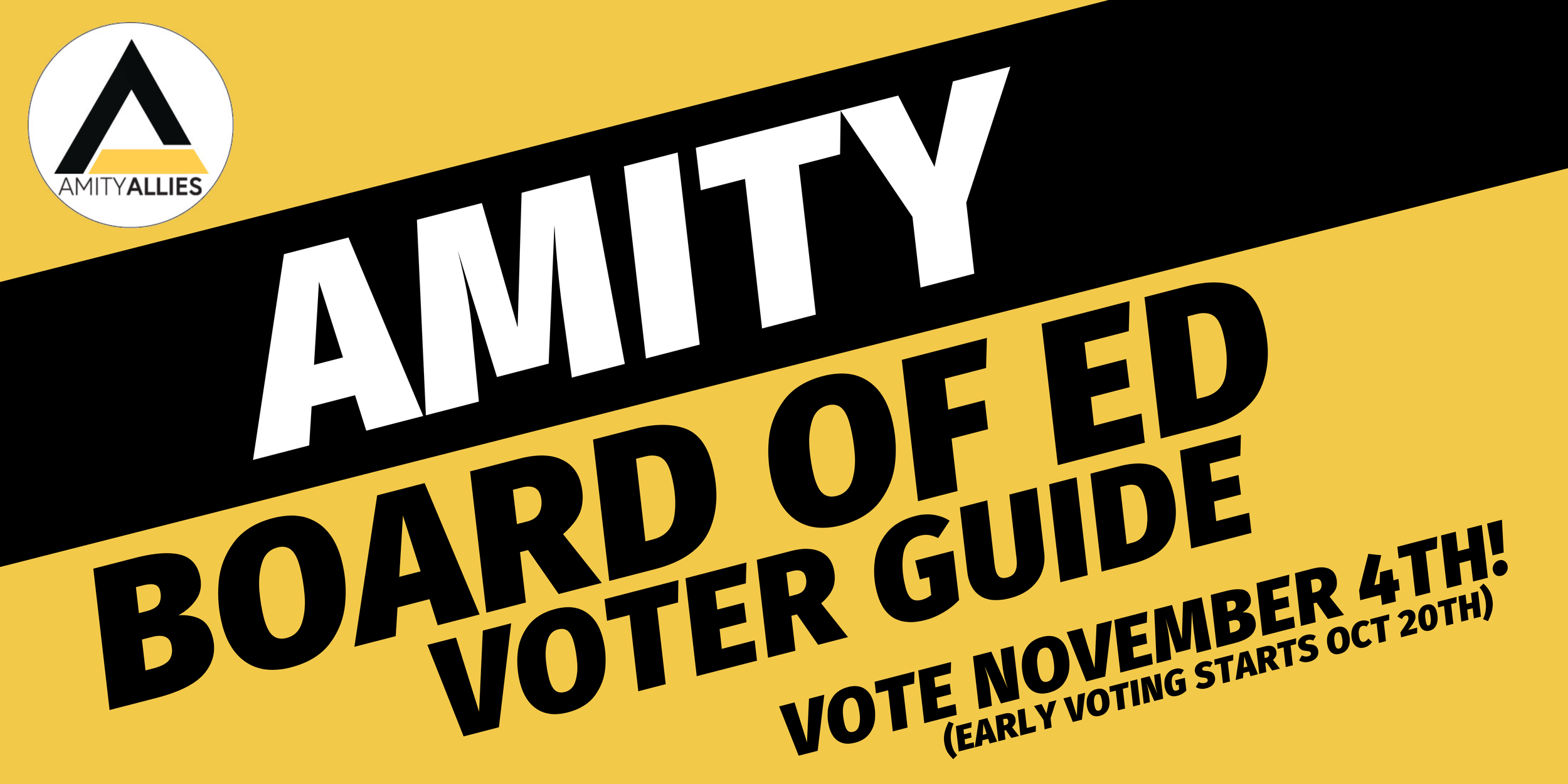Welcome to our Voter Guide!
In short, we invited all candidates for the Amity Board to answer questions relevant to what the Board does. Our goal is to help you, the voter, get to know them better so you can make an informed choice when you vote, whether through early voting (starting October 20th) or on Election Day, November 4th.
If you want the full low down on the voter guide and our process, you can click the banner above to learn more!
Once you’ve learned about this candidate, you can navigate to the next candidate’s page down at the bottom or just click a town seal to see all the candidates running in the town.
Sean-Michael Green (D) - Orange
“I am a veteran, an attorney, a professor, an entrepreneur, and a business leader. But more to the point, I am a father, a homeowner, and a neighbor. I want strong schools to create opportunities for our students and to enhance the values of our properties. My desire to serve is based on a belief that everyone should contribute in some way to the life of the community. I do not bring an agenda or list of grievances to the board, nor do I seek to use this role as a step towards any other destination. My desire is to serve to the best of my ability for the good of our community.
I appreciate the opportunity to run for this office on behalf of my town, and I am grateful to everyone who takes the time to read my responses here. Thank you.”
The questionnaire:
-
1. What qualifications would you bring as a member of the Amity Board of Education?
By day, I work as an entrepreneur. I am the CEO of a successful local company, and my law practice helps entrepreneurs to reach their goals. My professional life involves resolving complicated issues with a long-term view. Success is 25% financial and 75% employee and client satisfaction. My focus on strategy, goals, and happiness will serve our schools well.
In addition to these obvious skills, I bring a couple of other qualifications to the Amity BOE. First, I have significant experience serving on complex boards. I previously served as an officer of the boards for both CT’s Beardsley Zoo and Big Brothers Big Sisters; I currently serve on nonprofit boards, including as the vice president of Mind Over Land – a nonprofit helping with veteran mental health. Second, I have a demonstrated passion for education. I discovered a passion for learning after serving in the Marine Corps, and my journey took me through a community college, a public research university, and Ivy League schools. A career in higher education brought me to Connecticut more than 12 years ago. Today, I teach at UConn and Southern CT State University. Influencing the experience of students, teachers, and staff is not a new pursuit for me.
And of course, I have three children in Amity schools. Between them, their teachers, and their diverse set of friends, I have a constituency to keep me motivated as we work to achieve their goals.
-
2. What would you hope to accomplish in the next term as a member of the Board?
For better or worse, I am not arriving with a pre-planned agenda. I am not advocating big changes. We have a strong school system producing happy and successful students on a reasonable budget in a safe environment.
My goal is to work with the Board to make decisions that keep us on this trajectory. My tenure will begin with a steep learning curve. Although I am a parent and involved in many aspects of the school – including special education services -- I know that I will need to listen to voices in the community and learn from my fellow board members. My decisions will involve weighing the opportunities and costs as choices come before us. My goal will be to preserve the legacy of success that Amity has established and to continue to support learning and growing opportunities for students and teachers.
In short: I hope to accomplish fostering a safe and rewarding system filled with opportunities with the help of a dedicated Board.
-
3. Do you have any concerns about academics, curricula, or extra curricular opportunities (athletics, clubs, etc) at Amity?
My concern is not about any single activity or aspect of the school – but I want to ensure that every student has his or her community. I do not want any student to feel unwelcome, marginalized, or silenced. I know that many students self-select to be uninvolved in the life of the school, but I would like to extend every opportunity for them to connect. Goals are a product of a society. Our students will go farther together, so I want to encourage them in their social and extracurricular pursuits.
Moreover, I want our schools to be a desirable and rewarding place for teachers and staff to work. The hiring and retaining of high-quality teachers is a key benchmark for a successful school system. People work for more than a salary; they work for fulfillment, success, and happiness. Creating or maintaining this culture requires mindful action. The activities and academics at the school should present opportunities for the people who work in Amity as well as the students who attend the schools.
-
4. On what basis do you think the job performance of the Superintendent of Amity Schools should be evaluated?
There are some hard parameters by which the superintendent must be measured. Budget management, for example, is a topic that lends itself to easy measurement. Student outcomes are also important, although the board will need to work with subject matter experts to determine what kind of outcomes are most important and the tools by which we measure them.
In addition, I assert that there needs to be accountability for culture, satisfaction, and contentment. We are building a foundation on which lives and families will be built. Our ability to influence goes beyond the classroom. The superintendent should be measured in terms of effectiveness in creating a culture in which everyone has opportunities to get involved and find their passions.
The evaluation process should be transparent, inclusive, and holistic.
-
5. What are the primary criteria you would bring to considering the administration’s annual budget proposals for the Amity district?
It is important to be fiscally sound, including planning for contingencies and emergencies. The district needs to ensure that it has the funds to cover all projected expenses plus keeping funds in reserve.
That written, the money in the budget is earmarked for investment. We are making strategic investments in the future of our towns and their children. We need to ensure that money spent is viewed as an investment, and we would be right to measure or forecast a return on these investments. Where we have the ability to provide more opportunities, attract key staff, or promote the continued learning of our teachers, we need to make these investments. A dollar saved, in this context, is a dollar wasted. Frugality is not a virtue, but sound and thoughtful investment is.
-
6. How do you view the respective roles of the Board, Amity administration, the State of Connecticut, and the federal government in determining curriculum in the district?
At all levels, there is a role to play. The federal government sets broad policies and funding priorities – with recent talk of pushing more of this decision making to the state. The state sharpens the work of the feds, but it delegates many decisions to the districts. The federal and state government may set standards, but the schools determine how best to meet those standards.
The board approves the curriculum proposed and designed by our professionals in the schools. The teachers and staff are the subject matter experts in education; the board is the voice of the community. We ensure that our communities are served by the curriculum, that each student has opportunities through the curriculum, and that the desired outcomes are achieved.
-
7. How would you weigh your responsibility as an elected representative of your town and your duty to support the district as a member of its Board?
It is hard to envision many conflicts arising. The town’s interests should be aligned with the district’s interests in most circumstances. I can imagine disagreements about assessments of costs between the three towns, or perhaps differences of opinions about a path forward based on zip code – but these would seem to be rare and easily resolved.
My charge as an elected official will resolve or prevent most conflicts. My community is entrusting me to do what is right for the district. They are asking me to put the district first on behalf of the town. That is the scope of my service, and to do it well, I must pursue the best course of action for Amity. The district and its people are my priority.
-
8. How would you approach making decisions at Amity that may affect parents who also have students at the elementary school(s) in your town, such as those regarding the Amity schools’ calendar or a later start time at the middle and high schools?
The right approach is to try to respect the calendars of all three towns. Rather than a three-way battle to have the Amity calendar coincide with one town, I would love to be a part of the group that finds a solution that best serves all three towns. It is an issue of childcare and transportation to have all calendars at odds. I am eager to learn more about the challenges that prevent this simple collaboration.
In the absence of an elegant solution that serves everyone, I would treat my town the same way that I would treat the other two, and I would act in the spirit of the mandate handed to me by the voters: I would do what is best for the Amity district. I do not want to create issues for others to fix, but my allegiance is to Amity in this matter.
-
9. How would you make sure that everyone - including parents and students - feels welcome in the district, regardless of their political views (conservative, liberal, or moderate), faith, cultural background, race, or how they view themselves?
This is a matter of culture. We need to create a culture of tolerance and inclusivity through our policies and actions. It is more than a collective effort; it is also individual behavior. We cannot promote a culture of inclusiveness while turning our own eyes away from people. We cannot be afraid of our differences. In a perfect world, we will find connections in these moments; in the worst cases, we will at least learn and become more informed through communication.
The idea of making people feel welcome is at the core of my interest in this role. I want to ensure that every student, family, teacher, and community member is seen. I want to present opportunities for everyone. I want the superintendent and the board to be judged – in part – on the culture we create.
It is this culture that will make our schools, our children, and our communities strong.
Next Candidate
Meghan Rabuse
Meghan Rabuse
(click photo to read)






